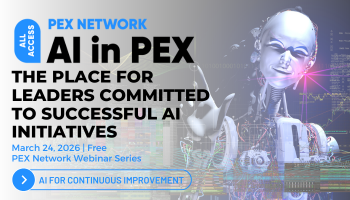Generative AI success sparks increased investment, intelligent automation reshapes operational paradigms – PEX Research & Reports News
Intelligent automation transforms operational possibilities, insurance business process outsourcing market growth, novel framework enhances outcome-based predictive process monitoring
Add bookmark
PEX Network’s weekly news bulletin rounds up the latest research, reports and publications in operational excellence (OPEX), digital transformation, artificial intelligence (AI) and automation, business process management (BPM), process mining and process intelligence and more.
This week includes:
- Generative AI success drives increased investment for businesses
- Enterprises not ready to address generative AI infrastructure and governance challenges
- Intelligent automation is reshaping operational paradigms
- Insurance business process outsourcing market shows strong growth
- Novel framework enhances outcome-based predictive process monitoring
Join the PEX Network community

Don't miss any news, updates or insider tips from PEX Network by getting them delivered to your inbox. Sign up to our newsletter and join our community of experts.
Learn MoreGenerative AI success drives increased investment for businesses
Organizations are seeing significant value from their early generative AI investments, with successes driving more spending. That’s according to Deloitte’s State of Generative AI in the Enterprise quarter three report. Two-thirds (67 percent) of surveyed companies are increasing investments in generative AI because they have seen strong value to date, the research found. Improved efficiency and productivity and cost reduction are the most common benefits sought from generative AI initiatives, cited by 42 percent of respondents.
For the rest of those surveyed, the top benefit achieved through generative AI is something other than efficiency, productivity or cost reduction. This includes increased innovation (12 percent), improved products and services (10 percent) and enhanced customer relationships (9 percent). “The diversity of possible sources of value from generative AI initiatives is exciting to many leaders and shows the potential and versatility of this new technology,” the report read.
However, many generative AI efforts are still at the pilot or proof-of-concept stage, with a large majority of respondents (68 percent) saying their organization has moved 30 percent or fewer of their generative AI experiments fully into production, the report stated.
 The PEX Report 2024/25: Global state of OPEX & business transformation found that AI will be the biggest investment area over the next 12 months, with more than half of businesses (58 percent) having discussed potential AI projects to drive OPEX and transformation objectives.
The PEX Report 2024/25: Global state of OPEX & business transformation found that AI will be the biggest investment area over the next 12 months, with more than half of businesses (58 percent) having discussed potential AI projects to drive OPEX and transformation objectives.
Enterprises not ready to address generative AI infrastructure and governance challenges
While generative AI is stoking enthusiasm for AI implementation and spending, enterprise AI initiatives are far from ready to address infrastructure and governance challenges. That’s according to a new survey by Domino Data Lab. The firm polled 278 global enterprise AI leaders about how their companies are deploying AI, the support they get and their leading concerns. The results revealed that although 21 percent of enterprises have a blank cheque from the board for all types of AI and 72 percent report sufficient board support, a third (34 percent) of respondents think generative AI gets more board support than it deserves, depriving support from other forms of AI.
What’s more, over 90 percent of enterprises need to make infrastructure adjustments to account for their generative AI journey, while 95 percent face a governance remodel or reboot to update their frameworks and processes for today’s modern model landscape.
Intelligent automation is reshaping operational paradigms
A new study explored the developments and future trajectories in the field of IA, offering a detailed analysis of its impact across various industries and organizational practices. Published in the International Journal of Computer Engineering and Technology, it examines recent advancements in AI algorithms and autonomous systems, with a focus on AI-driven process mining, self-learning systems and the integration of internet of things (IoT) with automation, wrote Sijo Valayakkad Manikandan, University of Texas. It also delves into the profound implications of these technologies for key sectors including manufacturing, healthcare, financial services, retail and logistics, highlighting how IA is reshaping operational paradigms and driving innovation.
“The article further investigates emerging trends and potential breakthroughs, such as explainable AI, edge computing, human-AI collaboration models and the promising applications of quantum computing in automation,” Manikandan added. The paper outlines strategic insights for organizations seeking to implement IA addressing adoption challenges, impact measurement and the cultivation of an innovation-driven culture.
Thought leader Doug Shannon discusses the impact of AI on intelligent automation
Insurance business process outsourcing market shows strong growth
The insurance business process outsourcing (BPO) market size has grown significantly in recent years, according to a report from The Business Research Company. The Insurance Business Process Outsourcing Global Market Report 2024 analyzed size and forecasts, investment opportunities, market drivers and trends. The insurance business process outsourcing market size is expected to see strong growth in the next few years. It will grow to $10.79 billion in 2028 at a compound annual growth rate (CAGR) of 8.6%, according to the report.
“The rising growth in insurance coverage is expected to propel the development of the insurance BPO market going forward,” the report read. Insurance coverage is in demand as it allows people to transfer the risk of possible losses to an insurance company in exchange for premium payments.”
Novel framework enhances outcome-based predictive process monitoring
A new academic paper proposed a novel framework for supporting explainable predictive process monitoring to predict the continuation of ongoing process executions. Most existing techniques use data attributes to explain the prediction outcomes, the authors wrote. However, explanations based on control flow patterns cannot be provided. “This omission may result in many valuable, actionable explanations going undetected.”
To fill this gap, this paper sets out PABLO (PAttern Based LOcal Explanations), a framework that generates local control-flow aware explanations for a given predictive model. “Given a process execution and its outcome prediction, PABLO discovers control-flow patterns from a set of alternative executions, which are used to deliver explanations that support or flip the prediction for the given process execution,” according to the researchers. Evaluation against real-life event logs shows that PABLO provides high-quality explanations of predictions in terms of fidelity and accurately explains the reasoning behind predictions. “A qualitative comparison showcases how the patterns that PABLO derives can influence the prediction outcome, aligned with the early findings from the literature.”
All Access: AI in Process Excellence 2026

Don’t get left behind. Join us at All Access: AI in Process Excellence to learn from leading experts, thought leaders, and practitioners who are on the ground experimenting, researching, and learning how to best use AI. They will share their secrets with you for free. And you’ll have the opportunity to network with fellow professionals as we navigate this new world. Register now to save your spot.
Register Now






























